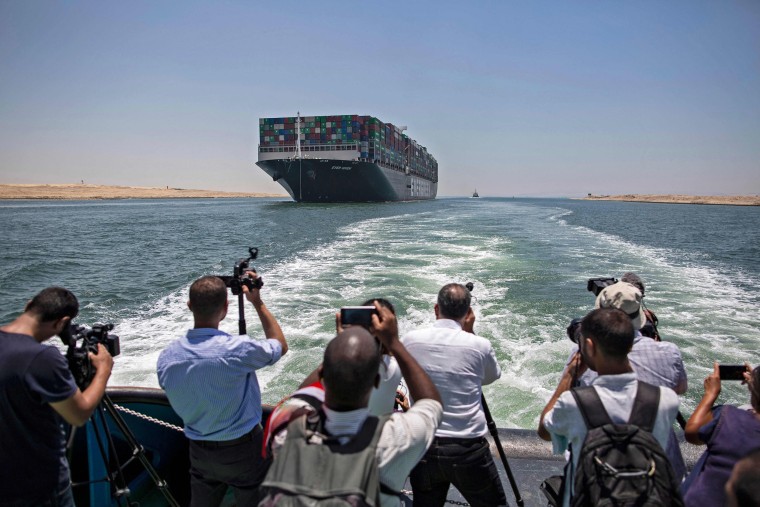CAIRO — The huge container ship that disrupted global marine traffic after it blocked the Suez Canal for nearly a week in March has been released and set sail Wednesday after spending months under seizure.
The 1,400-foot-long Ever Given, which carries cargo between Asia and Europe, ran aground and jammed the single-lane stretch of the canal on March 23 before it was re-floated six days later in a massive salvage operation.
A ceremony was held at the canal to mark the departure of the Panama-flagged ship and television broadcast showed the vessel finally leaving after being stuck in a holding lake in the middle of the Suez Canal for months as canal authorities and the ship owners negotiated a compensation deal after the six-day blockage threw international supply chains into disarray, paralyzing one of the world’s most crucial waterways.
Just days before the ship’s release on Wednesday, it was announced an agreement had been reached, but no details were released.
"I give the permission for the Ever Given to sail," the Suez Canal Authority Chairman Osama Rabie said at the ceremony. He added that the Suez Canal will continue to service ships of all sizes.
Khaled Abu Bakr, a lawyer for the SCA, said during the ceremony that the canal authorities were “committed to the terms of secrecy” about what was agreed in negotiations with the ship owners.
A spokesperson for the ship's Japanese owner, Shoei Kisen Kaisha Ltd., said in an emailed statement after the Ever Green set sail that the company will continue to use the canal for its fleet of ships and will remain a "loyal customer." The company also thanked the crew that stayed on the ship throughout the ordeal and acknowledged the delays for those with cargo stuck onboard.

The compensation is likely to center around the cost of the salvage operation, stalled canal traffic and lost transit fees for the week the Ever Given blocked the canal.
At first, the SCA demanded $916 million in compensation, which was lowered to $550 million in May because of new information about the value of the ship’s cargo. At the time, SCA chief Rabie told Egyptian media the ship owners offered $115 million in compensation.
The two sides have publicly traded blame on which party controlled the speed of the ship in the canal at the time of the incident, which party decided to enter the canal despite heavy winds and the number of tugboats present to escort the ship.
Download the NBC News app for breaking news and politics
On Tuesday, a local court officially approved a request from the Suez Canal Authority to lift the Ever Given’s seizure, and allow the ship to leave the canal and complete its journey to the port of Rotterdam in the Netherlands.
About 12 percent of world trade flows through the Suez Canal, a narrow, man-made canal dividing continental Africa from the Asian Sinai Peninsula. The canal usually allows 50 cargo ships to pass daily between the Mediterranean and the Red Sea, providing a vital trade corridor between Europe and Asia.
The Ever Given blockage had brought the key global trade route to a standstill and captured global attention as the world watched as dredgers worked non-stop to dislodge the stranded vessel, shifting huge quantities of sand, with experts initially fearing it could take weeks to completely free it.
Hundreds of ships had to wait for the canal to be unblocked, creating a maritime traffic jam visible from space, while some ships pondered taking the much longer route around the Cape of Good Hope at Africa’s southern tip.
Charlene Gubash reported from Cairo, Yuliya Talmazan from London.
